Tantra, Mantra, Yantra and Tibet:
Where Imperialism and Spirituality Collide
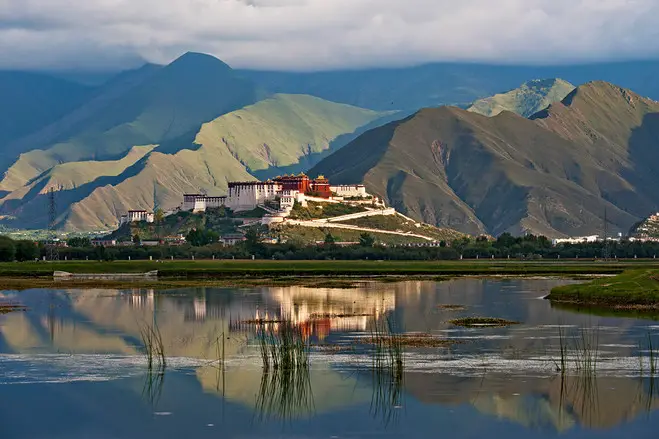
The
word ‘tantra’ signifies confluence and integration; a fusion. Sanskrit for “loom”,
a device which weaves together string into cloth, tantra is an ancient
word with many properties and uses; it has been variously used
to describe the knots of strings weaved together in a rug, and the cord on
which sacred mala bead necklaces were strung. (Mala beads are Tibetan
prayer necklaces of 108 beads used to assist mentally or vocally repeating
a mantra 108 times.) Today the word tantra is often used in reference
to the union of lovemaking.
More
broadly, however, tantra notes a mutually accepted connection, a tied knot
of intertwined being, like lovemaking, but not necessarily beginning with or
limited to it. Humanity itself is a tantra; a fused weaving knot or many
strings.
Essentially,
tantra is spiritual understanding of the relationship between
individuation and connection. An ancient spiritual philosophy preceding both
Buddhism and Hinduism, tantra represents integration, unifying the macrocosm
with the microcosm, the universal and the individual, the feminine and the
masculine, the yin and the yang. It can also refer to integrative
knowledge and its continuation and building through the interaction of teacher
and student, signifying union and fusion; the acceptance, integration and
transmutation of knowledge between individuals, like the string of life.
Tantra
should not be confused with yantra yoga from Tibet, or yantras, the sacred
geometric symbolism, just as the practice of yoga should not be confused with
being simply asanas or physical postures. Yantra yoga is one of the oldest
forms of yoga and because of the environmentally foreboding nature of Tibet and
the varying secretive cultures of most meditative movements, it is said to be
one of the purest and least altered forms of yoga. Yantra yoga concentrates on
moving into and out of asanas with the
breath, as opposed to being in a position for multiple breaths. However tantric
ideas are metaphysical; the
merging of the physical and spiritual. In essence, Tantra is the integration of
yantra (a philosophy and visual symbol), mantra (oral communication)
and mudra (meaning “gesture”, a physical positioning) — each of which
is important intertwined aspect of yoga, and life.
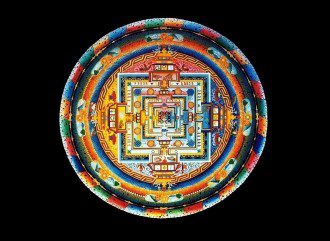
A
Yantra, the sacred symbolism representing the Geometry of Energy.
Teachers and Gurus
In
the past a teacher or guru was a requirement for such esoteric instruction. Today there are not
enough gurus relative to those who seek instruction, but there are
also more ways to learn more practices than ever. For example, Tapping and
Tai Chi, the 5
Tibetan Rites of Rejuvenation, and simple
meditative practices are accessible foundational techniques
that require little guidance. (Click
the links for a guided introduction to each practice.)
The
difference between a teacher and a guru is that gurus so profoundly embody a
teaching or philosophy that merely being in their presence imparts answers
without questioning. A guru has the ability to teach, learn and share spiritual
and meditative knowledge, but also has the power to transmit a comforting
presence, even a sense of bliss. Ideally we would all have gurus, not so that
we are shown what path to follow, so that – with knowledge and comfort –
we can come to know where we are going as we proceed on our own path,
becoming powerful individuals on our own, aided by the wisdom and grace of
those who have gone before us (without having to reinvent the wheel with each
generation.) They are akin to the elders and healers of other ancient
cultures, whose role is to share knowledge and pass esoteric
wisdom on to others in their tribe.
Today
in Tibet and the rest of the world, the number of empowered
individuals – the teachers and gurus – is eclipsed by the
number of institutionalized individuals who might benefit from their
wisdom. In times past, the wisdom of gurus was sought by seekers of the
highest order, but today, in this process of human ascension, the seekers’
numbers are rapidly growing. The institutionalized greatly outnumber the
individuated; most of us are under the thumb of authorities, busy tending
to survival within social constructs rather than building lives of
individuation, later realizing the need to climb the mountain of enlightenment.
Om Mani Padme Hum
~ The mantra of Tibet has complex meaning
suggestive of individual and universal connection, and is an invocation
of benevolence and compassion.
The Plight of Tibet
Like
the tantra, Tibet itself is a land of confluence, a land of intermingling cultures,
ideas and ancient philosophies. Tibet and the surrounding region is a land
of integration, where meditation practitioners spent most of their time in
seclusion so as to develop their mind, body and spirit in the pursuit of oneness,
of fusion with all that
is. These yogis and wise gurus are capable of amazing feats, not
the least of which was simply surviving in the extreme elevation Himalayan
cold without heat or modern protections from the harsh mountainous elements.
One of the first higher meditative practices in the esoteric Tibetan Buddhist
yoga practice called Naropa yoga is the practice of inner fire, the creation of
psychic heat, or Tummo.
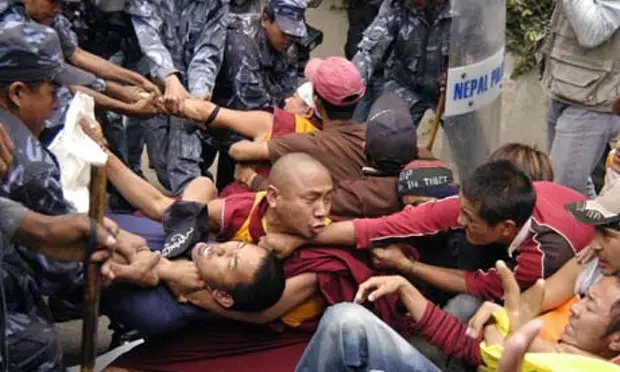
Displaying
of “Free Tibet” banners and the Tibetan National flag is restricted by Chinese
law in Nepal.
But
today, Tibet’s gurus and the power of their inner heat have been overwhelmed,
scattered by repressive authorities, driven from Tibet — along with their
ancient philosophies — and driven to submission by the worldly ways
of national and cultural institutions. The
International Campaign for Tibet describes the factors at play succinctly:
Tibetans are denied the space to develop and express
their distinct culture and identity as the Chinese government’s vision of
progress and development takes shape in Tibet… China’s economic policies
in Tibet are based on a political agenda that fails to consider Tibetan needs,
views, and livelihoods…
Tibetans cannot freely study and practice their religion.
Government restrictions on celebrating important Buddhist anniversaries and
required denunciations of the Dalai Lama further demonstrate the exclusion of
Tibetans from the decision making process that determines the practices of
their daily lives…
Sadly,
the gurus of Tibet who carry the wisdom of their forebears have been
disenfranchised or eliminated, in the same way as the spiritual
teachers of most of the world. It is just more recent and
perhaps most starkly apparent in Tibet. While it is one of many places to
be occupied by force, the forceful institutionalization of such a profoundly
spiritual nation like Tibet is a distinct horror, revelatory of how low the
priorities of humanity societies have sunk. The indigenous Tibetans
have undergone forceful gentrification and destruction, as is typical of
all institutional takeovers. The Chinese institutions are dominating and
destroying the Tibetan culture of monastic mountain retreat, and societies
around the world have allowed the apartheid-like rule of Tibet to happen
without ever catalyzing a proactive political strategy or boycott of the
Chinese aggressors.
Perhaps
if Tibet was rich in oil resources, the West would be more interested. Perhaps
if we were all less concerned with the materialistic and more interested in the
fantastic, we would all be more interested.
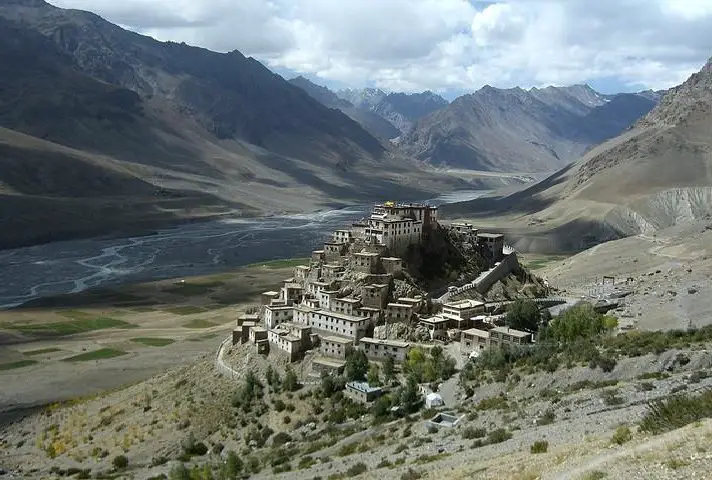
Key
Gompa Monastery is a 1000 year old Tibetan Buddhist monastery located at an
altitude of 4,166 meters (13,668 feet) in Tibet’s Spiti Valley.
Where Imperialism and
Spirituality Collide
Allowing
one of the most spiritual and compassionate nations to ever exist is a sad example of
the postmodern collective gone astray; of worldlings lacking spirituality,
hungry and distracted by the mechanics of institutional imperialism. Given
the state of our world today, we ought to assist and uphold those who seek
to live concentrating on spiritual development. This was the way of Tibetan
culture, which supported the pursuits of the monastic. But today in China
there is rampant religious repression of Tibetan Buddhism, and Falun Gong, and
Christianity, and likely any belief system that officials see as a
potential threat or outlet for a threat to their institutional hierarchy.
Such
cultural repression stems from the fact that spiritual devotion leads to
individuation, to individual empowerment and, therefore, ultimately to the
empowerment of the human collective. Institutions, including but not
limited to China, would prefer to keep everyone in their domain
controlled, quiet and unaware of their individual potential. Similarly, many
martial arts have been deliberately changed over time so as to not allow people
to develop their fighting ability, sure, but also to prevent them from gaining
the potential metaphysical understandings inherent in their practice as
well. Tai chi,
for instance, has many times been transformed from an internal/metaphysical
martial art – a tantra –
to simple exercise, reducing the results and hiding its potential.
As
I said, devoted practice to tantric principles leads to individuation, the
opposite of imperial institutionalization.
Gate Gate Paragate Parasamgate Bodhi Svaha
~ the Heart Sutra, meaning “Gone, gone,
gone beyond, gone completely beyond, enlightened, so be it.”
China
recently enacted laws essentially taking over Tibetan Buddhist monasteries and instituting
government officials at the few remaining monasteries, seeking instead to
turn monasteries into propaganda centers for Chinese Communist philosophy.
China also recently enacted a law attempting to limit Tibetan Buddhist
reincarnation without government permission, and claiming
the right to decide who is the next reincarnation of the Dalai Lama.
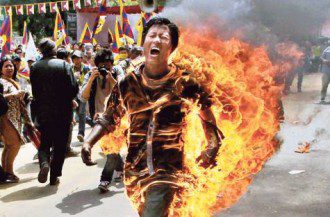
Self-immolation,
the act of public self-sacrifice as a desperate form of protest.
In
reality, the Chinese involvement in Tibet was no short of a military takeover.
In October 1950, China’s People’s
Liberation Armyentered Tibet, defeating minor resistance from the
Tibetan army, killing countless Tibetans, destroying thousands of
monasteries. And China has remade the nation of Tibet as theirs ever since.
Some Tibetans, cornered by rigid oppression, have resorted to self-immolation
– the act of public
self-sacrifice – in order to call attention to the corruption
and gentrification of their culture. Many have set themselves on fire to raise
awareness of their exploitation and cultural elimination, in the most desperate
form of protest we have seen in modern history.
Traditionally,
Tibet is a land of indigenous integration; the mountainous crossroads of
Asia. Tibet was a spiritual nation, one of tantra and sharing, where many spent
their entire lives dedicated to the spiritual journey and those around them
supported them. This contrasts starkly to societies throughout most of the
world today, that selfishly pursue materialistic and competitive goals, where
assisting the spiritual development of others let alone following one’s own
spiritual path are not primary considerations for most people; and in some
cultures, like our own, derided.
The
Dalai Lama — literally translated as “Ocean Guru” — the
spiritual leader of Tibet is not chosen but rather found through spiritual
predictions and tests concerning his lineage, not through familial
heritage but through reincarnation. A custodian of wisdom, each Dalai Lama
is believed to be the reincarnation of the great spiritual teacher,
Avalokitesvara, the Bodhisattva of Compassion. The current Dalai Lama, Tenzin
Gyatso, is the 14th reincarnation of Avalokitesvara, identified in 1935 by
a member of the Tibetan monastery in a vision that led to
his discovery.
Despite
losing his homeland and despite his people being dispersed, and worse, the
Dalai Lama remains positive, for even though Tibetan Buddhism is being restricted
in Tibet by the encroaching imperialism of China it has been freed to the
world. Its teaching, philosophies, tantras, mantras yantras and mudras have
struck a chord of resonance with spiritual seekers the world over.
One reason, among many, is that Buddhism holds the distinction of being the
only established religion that does not claim to define the creator of
life (known variously as God, Allah etc.) nor offer access to
the creator through any “one true faith” — a ridiculous notion when one considers
the common
origins of religions and theologies. Distinguishing it from other
religions, Buddhism is built on philosophies of life and enlightenment, not
authorship of life itself. The central figure in Buddhism, both traditional
(Theravada) and Tibetan, is not a creator but a philosopher, a bodhisattva, a being
of bodhi (enlightenment) and universal compassion. Its teachings can
therefore be accessed without submission to the “higher” external power
extolled by other religious doctrines, but through the exploration of
consciousness and being. This is where the gurus and teachers become an invaluable
part of the process.
The
idea of an “ocean guru” might be at first confusing, especially from the
mountains of Tibet. However the ocean symbolizes consciousness, the ethereal
force everywhere of which we are but a drop — though within us is an ocean unto
ourselves. It represents our interconnection — the tantric element that
binds all aspects of life.

This
idea also reminds me of aspects of many meditations, Buddhist and otherwise,
where one imagines being a conduit of compassion, ultimately visualizing that
compassionate energy eventually crossing the oceans. One way I learned this is
to meditate and imagine that your loving presence emanates and extends across
the oceans. Begin with imagining the removal of suffering and instilling
happiness to all sentient beings thirty miles beyond you, then three hundred
miles, then throughout your continent, then across the ocean nearest you, then
all oceans and then the whole world, and beyond. In order to really benefit
from any meditation and meditative movement it’s important to include such
compassionate thinking in your practice.
Ong Namo Guru Dev Namo
~ meaning “I call upon the Divine Wisdom
and bow to this Wisdom.”
In
Tibet and across much of Asia, reincarnation is considered to be a fact that
science cannot yet explain, a simple process of spiritual evolution. There are
numerous instances of children knowing information which could indeed be explained
in no other way but reincarnation and remembering past life experience, as well
as other “extraordinary” psychic powers. Locating the next reincarnation of the
Dalai Lama always requires psychic predictions of sorts. No other communist or
democratic nation in the world has upheld such spiritual transition of power in
modern times, or perhaps ever.
Most
all national and imperial institutions keep power in the family or transfer
it through another form of oligarchy, rather than through spiritual
transition. Almost all national institutions act primarily to maintain and
obtain power, resulting in war states, buffer states and ever-changing borders.
The U.S. doctrine
and history of perpetual war is a perfect example. Nations frequently act
out of fear of loss as well as striving for potential gains. China took
over Tibet when England left India and Tibet no longer was useful as a buffer
state. Until then, Tibetans walked or rode horses wherever they went,
respecting a prophecy which stated that, when the wheel comes to Tibet the
nation would fall — a prophecy that was fulfilled. China took over Tibet like
so many other nations have taken over so many other spiritual places; like
England took over India, and the European nations took over the indigenous
tribal cultures around the entire world. Through centuries of colonialism,
imperial nations have decimated not just the sovereignty and cultural
identity of nations like Tibet, but also the spiritual heritage and wisdom on
which they were built.
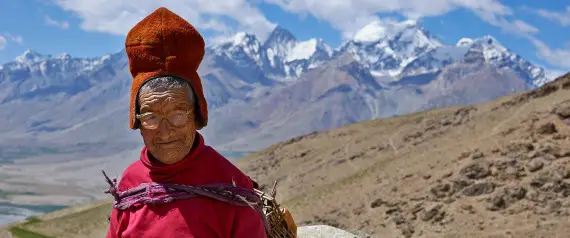
A
Tibetan Buddhist nun from the The Tibetan Nuns Project, providing basic humanitarian
aide to refugees from Tibet in India.
Crossroads
Tibet
is an incredibly rich cultural fusion. It is a place of mountain isolation
and alternatively a place of integration at the crossroads, where it’s said
your hand in the sun can burn while your other hand in the shade is
frostbitten. Great Indian gurus travelled to China via Tibet and likewise great
Chinese philosophers and physicians went to India via Tibet. Even the legendary
Mongolian armies came to Tibet as did people from the Muslim world and
throughout Asia. Tibet is the Himalayan roof of the world and to a large
extent, it was the center of the ancient world.
When
Buddhism reached the Himalayan Mountains of Tibet from India, it was integrated
with ideas in the shamanistic Bonn religion, the prominent form of worship in
Tibet. In Tibet the indigenous Bonn ideas, Buddhism, some Hindu beliefs, some
Taoist and Chinese influences and other cultural philosophies were all
variously merged together and fused into Tibetan Buddhism. Tibetan Buddhism,
like all Buddhism, is based on compassion for all sentient beings and
embraces many esoteric philosophies and practices of legendary mountain
yogis.
Instead
of passively allowing the decimation of this ancient and enlightened
culture, it is our duty in the West to stand up and uphold its sovereignty,
to learn from its traditions and respect its ancient teachings; not only
because it is the right thing to do, but because of what Tibet and its
philosophy and history represents, as humanity itself stands at the
crossroads between imperialism and spirituality.
Lokah Samastah Sukhino Bhavantu
~ meaning “May all beings
everywhere be happy and free, and may the thoughts, words, and actions of my
own life contribute in some way to that happiness and freedom for all.”
To
learn more, visit The
International Campaign for Tibet website.
Tibetan Fusion
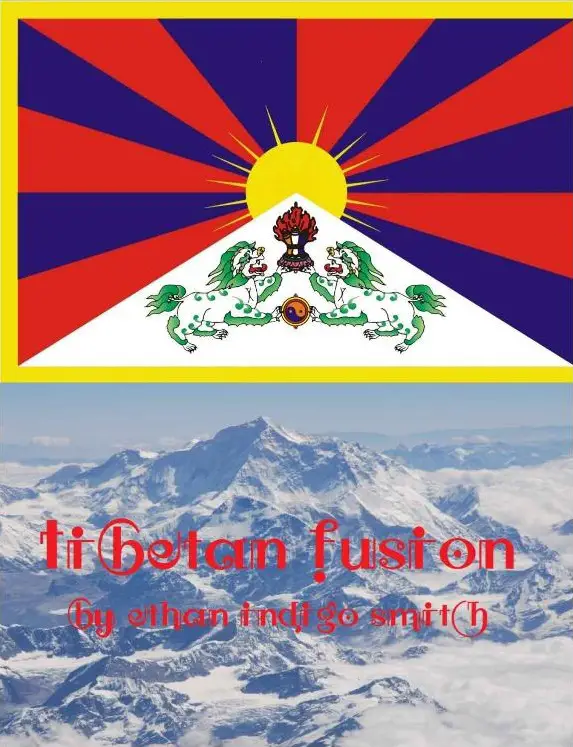
Ethan
Indigo Smith’s book “Tibetan Fusion” is an exploration of meditative movements
that work by themselves, and together form a comprehensive way to develop your
natural energy.
Combining
elements of a variety of meditative practices and self-healing techniques
(including Yoga, Tai Chi, Chi Gung and The Five Tibetan Rites of Rejuvenation,
Tibetan Fusion provides a “map” of the body’s overall energy
landscape with specific directions to help you achieve heightened
energy, balance, strength and inner well-being — all without
equipment or a “master”.
Tibetan
Fusion is available here on Amazon.
From Wake Up World
@ http://wakeup-world.com/2015/10/14/tantra-mantra-yantra-and-tibet-where-imperialism-and-spirituality-collide/
The 5 Tibetan Rites of Rejuvenation:
108 Movements to a Meditative Mind State
 It
just so happens that one of the quickest and simplest sets of meditative
movements
and one of the easiest to integrate as your own, is also one of the most
powerful. The Five Tibetan Rites of Rejuvenation take about twenty minutes or
so depending on how long you meditate, the longer the better of course.
It
just so happens that one of the quickest and simplest sets of meditative
movements
and one of the easiest to integrate as your own, is also one of the most
powerful. The Five Tibetan Rites of Rejuvenation take about twenty minutes or
so depending on how long you meditate, the longer the better of course.
There
are many ways to do the Five Tibetans and the movements will benefit you in
multiple ways also. As with all meditative movements, part of the reason people
are adverse to beginning it – part of the reason we allow our ego to convince
us we do not need to do such practices – is because we see that they take time.
But remember meditative movements make time, they give you more energy and more
efficiency.
The
Five Tibetan Rites of Rejuvenation were not designed as beginner yoga, nor are
they, but the fact they only take twenty minutes or so makes them totally
accessible to our busied mind and active lifestyle that prevents us beginner
yogis from beginning. I have described some finer points of each in the
following.
5 Tibetan Rites of Rejuvenation
There
are 5 movements done 21 times and 1 movement done, most frequently, 3 times, equating
to 108 breath coordinated movements. Each of the Tibetans are followed by
taking two breaths so as to balance out the energy just moved. The Sixth
Tibetan is only performed after you are capable of doing 21 breath coordinated
movements of the Five Tibetans and doesn’t have to be included otherwise. One
can begin doing any number of each Rite that you feel comfortable with, but try
to do an equal number of each.
The
first Tibetan is
simply spinning clockwise with the arms active to the sides. The first Rite is
done clockwise in unison with the sun for the chakras are said to spin
clockwise. When held up such activates and opens up the arms, shoulders and
neck. Try going excruciatingly slow. The Five Rites strengthen and activate the
abdominal area and neck. These areas are considered the most problematic and
clogged in terms of energetic and chakra understandings too. The Rites open up
the chakras.
Then
take two breaths like Superman, that which devoted practice can turn you into.
Hands are at your hips. Take a deep breath through your nose and exhale through
your mouth with lips shaped in an O like Superman blowing out cold air.
The
trick to the second Tibetan
is to lift up and set down the legs and neck in unison. Each Tibetan is done in
unison with the breath and as with all meditative movement, the inhale is
tension/activation and exhale is relaxation/release. So each movement begins
with inhale and returns with exhale. The easiest way to count is to count 1 on
the inhale and 1 on the exhale, counting each twice so you are less likely to
lose track.
A
trick with the third Tibetan
is to think about using your hands as support and about bringing bring your
back so that it returns to being perpendicular or just slightly past
perpendicular, a degree or two forward. Go slow.
The
trick to the fourth Tibetan
is to initiate the movement with your neck opening the throat chakra.
As
you progress you will eventually be able to do the fifth Tibetan with opened joints and
ligaments doing Hindi pushups where your face glides along just above the floor
and then rises up, like a cobra, on the return/release.
Remember
to breathe twice like Superman in between each Rite.
The 6th Tibetan
The
trick with the sixth Tibetan
is to not do it unless you can do 21 of each of the first Five. I find three of
the sixth Tibetan is optimal and no more than five is advised. For more
specifics on the Five Tibetan Rites check out 108 Steps to Be in The Zone
From Wake Up World @ http://wakeup-world.com/2013/06/13/the-five-tibetan-rites-of-rejuvenation/
For more information about Tibet see http://nexusilluminati.blogspot.com/search/label/tibet
For more information about tantra see http://nexusilluminati.blogspot.com/search/label/tantra
For more information about tantra see http://nexusilluminati.blogspot.com/search/label/tantra
- Scroll down
through ‘Older Posts’ at the end of each section
Hope you like this
not for profit site -
It takes hours of work every day by
a genuinely incapacitated invalid to maintain, write, edit, research,
illustrate and publish this website from a tiny cabin in a remote forest
Like what we do? Please give anything
you can -
Contribute any amount and receive at
least one New Illuminati eBook!
(You can use a card
securely if you don’t use Paypal)
Please click below -
Spare Bitcoin
change?
For further enlightening
information enter a word or phrase into the random synchronistic search box @
the top left of http://nexusilluminati.blogspot.com
And see
New Illuminati – http://nexusilluminati.blogspot.com
New Illuminati on Facebook - https://www.facebook.com/the.new.illuminati
New Illuminati Youtube Channel - https://www.youtube.com/user/newilluminati/playlists
New Illuminati’s OWN Youtube Videos
-
New Illuminati on Google+ @ For
New Illuminati posts - https://plus.google.com/u/0/+RamAyana0/posts
New Illuminati on Twitter @ www.twitter.com/new_illuminati
New Illuminations –Art(icles) by
R. Ayana @ http://newilluminations.blogspot.com
The Her(m)etic Hermit - http://hermetic.blog.com
DISGRUNTLED SITE ADMINS PLEASE NOTE –
We provide a live link to your original material on your site (and
links via social networking services) - which raises your ranking on search
engines and helps spread your info further!
This site is published under Creative Commons (Attribution) CopyRIGHT
(unless an individual article or other item is declared otherwise by the copyright
holder). Reproduction for non-profit use is permitted
& encouraged - if you give attribution to the work & author and include
all links in the original (along with this or a similar notice).
Feel free to make non-commercial hard (printed) or software copies or
mirror sites - you never know how long something will stay glued to the web –
but remember attribution!
If you like what you see, please send a donation (no amount is too
small or too large) or leave a comment – and thanks for reading this far…
Live long and prosper! Together we can create the best of all possible
worlds…
From the New Illuminati – http://nexusilluminati.blogspot.com
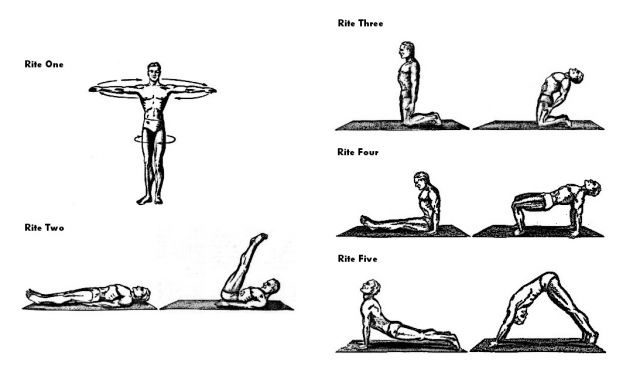
ALL is woven together... If this is true, then ALL is Buddha consciousness, even the abstract concept of imperialism. The student and the Guru are ONE in the same, are they not? If ALL is woven together the consciousness of the student is as relevant as that of the socially accepted guru, no? YES! ENERGY is transcendent of judgment. The essence of life is energy consciousness which doesn't have any value structures that deem one specific kind of energy more important than the rest, but the fiction of energy manipulation through conscious story telling ACTS for the purposes of game theory throughout the framework of attaining a socially accepted kind of fairy-tale that gives authority of ONE over another through intricate web of human life.
ReplyDeleteThrough the intricate web of human life, we experience energy consciousness and it's myriads of transformations and hence energy transformations in human consciousness do not depict or define systems based on hierarchies that are ACTED upon the worlds stage for the sake of claiming a specific kind of superior dominance over all others. We simply partake in a play which is losing credibility because the play serves no one, not even the make believe king and queen.... The universal human energy field is transforming itself to a more level and balanced energy distribution among ALL, which is dictated by the physical laws of nature. The power of myth has served it's purposes for creating the illusion of human superiority but know technological know how serves EVERYONE in ways that actually expose the myth makers and their lucky charmers with spells that cannot be cast from the shadows because ALL is revealed in the field of the LIGHT fantastic.
ReplyDelete